-
New scanner allows passengers to take liquids on board
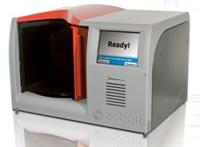
A new bottle scanner enables aircraft passengers to carry liquid items larger than 100 ml once more; airports could now allow passengers to take items such as water, cosmetics, perfumes, and duty free through airport security channels from as early as 2013
-
-
Buffalo airport perimeter security found 100 percent accurate
A recent Transportation Security Administration (TSA) report found that the new perimeter security system at Buffalo Niagara International Airport in New York was 100 percent accurate in tracking and detecting intrusions
-
-
Canada tests explosive detecting ticket readers
In a pilot program, Canadian light rail passengers in Edmonton will be scanned for explosives as they pass through ticket turnstiles in a seamless system that avoids recreating the long lines of airport security checkpoints
-
-
TSA screens employees for radiation from body scanners
In response to fierce criticism that the Transportation Security Administration (TSA) was needlessly exposing millions of airport passengers to potentially harmful amounts of radiation, the agency has agreed to measure radiation exposure levels from full-body scanners at 100 airports across the country
-
-
Accenture to bolster capabilities of US-VISIT
DHS has awarded Accenture Federal Services a 13-month, $71 million contract further to enhance the capabilities of US-VISIT
-
-
More travelers worry about health effects of airport scanning
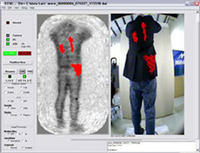
More than 1 in 5 passengers in a recent survey (23 percent) said they would refuse to be examined in one of the whole-body scanners now in many airports; a third of people under 35 said they would decline the scans; the debate among health and radiation experts continue, with no consensus yet about the health effects of airport screening
-
-
Coast Guards blocks Hawaii bay to protect president
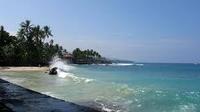
The Coast Guard has established a security zone in the waters of Kailua Bay to protect the president on his family during their holiday vacation; unauthorized people entering the zones are subject to penalty of $40,000 for each violation or a criminal penalty resulting in imprisonment of twenty-five years; the exclusion zone will be in effect until 7 January
-
-
TSA union blasts DHS over labor dispute
Union representatives of Transportation Security Administration (TSA) employees sharply criticized the agency’s leaders over its approach to labor negotiations
-
-
Accenture wins $71 million contract for US VISIT
On Wednesday Accenture Federal Services announced that it had won a thirteen month, $71 million contract with DHS to bolster its immigration and border management systems
-
-
Underwater drones help NYPD secure harbor
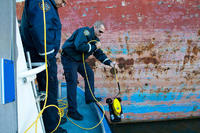
The New York Police Department (NYPD) has a new high-tech ally in its fight to keep the city safe from terrorists; to help sweep the city’s waterways and bridges of dangerous bombs, the NYPD’s Harbor Unit recently acquired six unmanned underwater drones that help sniff out explosives
-
-
New GOP bill targets TSA screeners
A new bill introduced by House Republicans would prohibit Transportation Security Administration (TSA) employees from wearing badges and uniforms that resemble a police outfit
-
-
Model airplane hits federal building
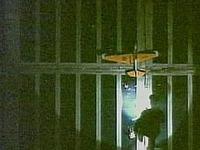
Last week a three-foot model airplane crashed into a federal building in Waltham, Massachusetts; federal investigators from DHS and the FBI promptly began investigating the incident, but so far no evidence exists to suggest any foul play; earlier this year a 26-year old man from Massachusetts was arrested for plotting to attack the Pentagon with a remote-controlled plane packed with explosives
-
-
New autopilot makes another 9/11 impossible
A hijacking-proof piloting system for airliners is being developed to prevent terrorists repeating the 9/11 attacks. The mechanism is designed to make it impossible for terrorists who highjack a plane to crash the aircraft into air or land targets. The device enables the plane to be flown by remote control from the ground in the event of an emergency.
-
-
Underwater drones help police keep harbors safe
Growing attention to underwater security along U.S. coasts has resulted in an increasing reliance on a relatively new tactical weapon for the police: an unmanned submersible drone, often referred to as a remote-operated vehicle, or ROV. The NYPD has six of these underwater drones, similar to those in use by the United States military and by oil companies with offshore operations.
-
-
Congressional transportation security caucus formed
On Thursday members of the House Homeland Security Committee announced that they were starting a “Transportation Security Caucus”
-
- All
- Regional
- Water
- Biometrics
- Borders/Immig
- Business
- Cybersecurity
- Detection
- Disasters
- Government
- Infrastructure
- International
- Public health
- Public Safety
- Communication interoperabillity
- Emergency services
- Emergency medical services
- Fire
- First response
- IEDs
- Law Enforcement
- Law Enforcement Technology
- Military technology
- Nonlethal weapons
- Nuclear weapons
- Personal protection equipment
- Police
- Notification /alert systems
- Situational awareness
- Weapons systems
- Sci-Tech
- Sector Reports
- Surveillance
- Transportation
Advertising & Marketing: advertise@newswirepubs.com
Editorial: editor@newswirepubs.com
General: info@newswirepubs.com
2010-2011 © News Wire Publications, LLC News Wire Publications, LLC
220 Old Country Road | Suite 200 | Mineola | New York | 11501
Permissions and Policies
Editorial: editor@newswirepubs.com
General: info@newswirepubs.com
2010-2011 © News Wire Publications, LLC News Wire Publications, LLC
220 Old Country Road | Suite 200 | Mineola | New York | 11501
Permissions and Policies
